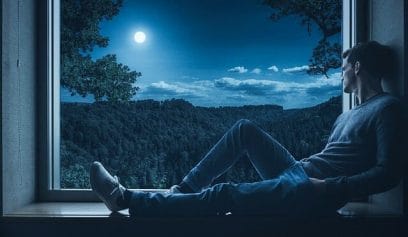Melatonin is being talked about more and more in the context of reducing sleep problems. This amazing organic compound is able to “put to rights” our dysregulated diurnal rhythm, and thus give us back a healthy, deep sleep. Find out what melatonin is and how it works.
Table of contents
Melatonin – the hormone responsible for a healthy sleep
Melatonin synthesized in the pineal gland is a hormone that guards the proper sleep and wakefulness cycle. Melatonin is produced by the amino acid tryptophan. From tryptophan, 5-Hydroxytryptophan (5-HTP) is formed, from which serotonin is then formed, from which melatonin is later formed. When the level of melatonin in the body is inadequate, sleep disorders occur, manifested among others by numerous awakenings during the night and problems falling asleep.
In the natural diurnal rhythm an increase in melatonin concentration in the body occurs when darkness falls, and when it becomes light, melatonin production gradually ceases. The highest level of melatonin is reached around 1 to 3 pm. Everything seems clear and logical – melatonin, the hormone responsible for sleep, is secreted when it is dark, so we should have no problems with sleeping normally at night and waking up in the morning full of vitality. The point is that in many people the level of this hormone is too low or incorrect at a given time of day (e.g. there is too little of it when we would like to go to sleep and there is too much of it during the day). This state of affairs generates increasing problems with sleep and deterioration of mood and psychophysical condition.
Melatonin deficiency in the body
Insufficient level of melatonin in organism may result from physiological, environmental and lifestyle factors. It is worth to know that with age, the body produces less and less of this hormone, which does not mean that everyone in the autumn of life is doomed to insomnia. No, it doesn’t. Many people of mature age have no problems with sleep, although theoretically their body produces much smaller amounts of melatonin. Nevertheless, it is a fact that children have the highest concentration of melatonin in their bodies, this hormone remains at a high level also in young people and people around 30 years of age, whereas after 40 years of age melatonin production begins to slow down.
Age is not the only physiological factor that may be responsible for melatonin deficiency in the body. Sometimes its low level is associated with hormonal disorders, slowed metabolism, as well as some diseases, for example eye diseases. In many cases, too low levels of melatonin are associated with our lifestyle. For example, a person who works in shifts may have a disrupted diurnal rhythm, which translates into impaired melatonin production.
Also, sitting for long periods of time at night, especially with strong lighting or bright screen of a monitor or TV, may affect the production of melatonin, and thus problems with falling asleep and other sleep disorders. In addition, stimulants and some medications, irregular sleep, going to bed at different times, lack of an evening ritual of calming down and gently entering the sleep mood are also factors that are not conducive to normal levels of melatonin.

Finally, it is worth mentioning environmental factors that can cause disruptions in the secretion of the sleep hormone. These include changes in time zones associated with travel to other corners of the globe and the autumn-winter season, during which we are exposed to a small amount of natural light. In the period when days are short, grey and the sun is a rarity, the body begins to produce melatonin earlier, hence the feeling of sleepiness, which often accompanies us during the day in autumn and winter. At night and in the morning melatonin production may slow down, hence shallow sleep, night awakenings and premature getting up.
Melatonin for sleep – you can help yourself!
If we suffer from sleep disturbances related to disruption of the diurnal cycle and insufficient production of melatonin, changes in lifestyle may help us, including restriction of stimulants, going to bed at one time, giving ourselves an hour of relaxation before going to bed (reading a book or listening to relaxing music in soft light etc.). However, it is not always possible to eliminate all factors that interfere with proper production of sleep hormone. In many cases, a good solution is to reach for sleeping pills with melatonin.
There are many preparations of this type available on the market, in most of them they are enriched with other ingredients facilitating falling asleep and supporting healthy sleep. However, melatonin in tablets should be taken strictly according to the recommendations of the manufacturer of a given preparation. Its excess in the body is not beneficial, as well as its deficiency. Currently, the richest melatonin tablets in terms of composition is Melatolin Plus.
Read also: How to fall asleep quickly

